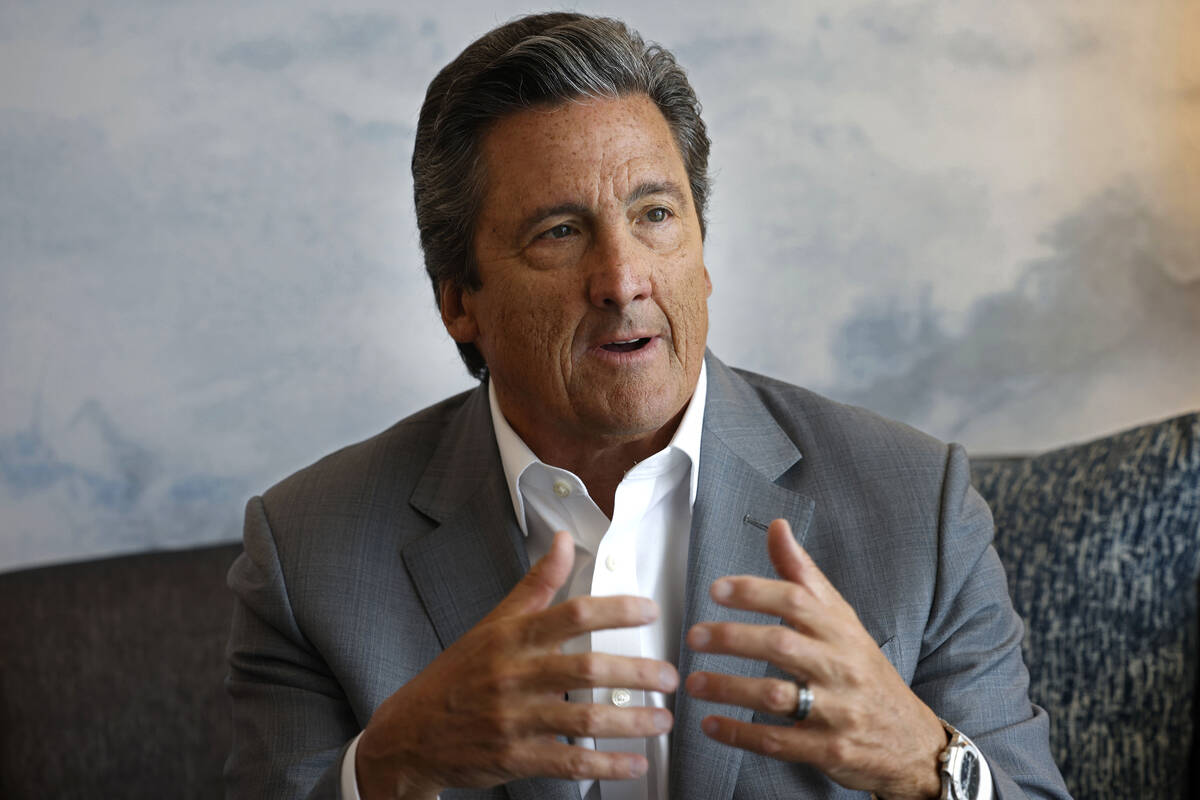MGM’s CEO discusses international projects, I-15 corridor
Nevada’s largest company is putting an emphasis on the “international” in MGM Resorts International.
MGM President and CEO Bill Hornbuckle, 65, just off last week’s signing of a licensing agreement with Marriott International that is expected to increase visitation from high-end Marriott travelers to Las Vegas, discussed the company’s international initiatives as well as the company’s prospects in New York and efforts to ease traffic between Southern California and Las Vegas.
Comments in his exclusive interview with the Review-Journal were edited for brevity and clarity.
Review-Journal: Let’s look at some of MGM’s investments abroad. Is the recent wave of improved results in Macao benefiting the company in that market?
Bill Hornbuckle: It’s generally been about 20 percent of our bottom-line earnings in terms of cash flow for the company. To see the market return to the extent that it has is something we’re excited about and pleased with. We’ve taken more than our share historically. Pre-pandemic, we were below 10 percent market share. I think we’re enjoying 13, 14 and 15 percent in some months this year. It’s a big piece of our business and an important link to Asia for us. It’s off to a great start as far as we’re concerned.
RJ: Please give me an update on the status of building an integrated resort in Osaka, Japan.
Hornbuckle: It’s early in the game, but for us, it’s been a 12-year journey. We’re looking forward to signing our area development plan this fall and starting in earnest on the ground, hopefully, by middle to late next year in terms of pylons and beginning construction. We’re shooting for a 2030 opening.
RJ: Is this property on reclaimed land?
Hornbuckle: Yes, it’s called Yumeshima Island. Interestingly, it was originally built to compete for the ’72 Olympics, and it’s been sitting there since. It’s got a couple things on it. It’s going to house the World Expo in 2025, so a lot of the infrastructure and some of the other things we need for tourism will be brought to bear, and then we’ll follow up and be the extension and the continuation of that with MGM.
RJ: Is there a project update on MGM’s holdings in the United Arab Emirates?
Hornbuckle: We’re excited with our project with Wasl (Asset Management Group). We have a hospitality project we’ve announced there that’s under construction. Time will tell with what ultimately happens in terms of gaming, but for now, we’re focused on the hospitality we’re building. It’s a small man-made island called Porto Island. It sits right at the base of Jumeirah Beach. There will be an MGM, a Bellagio and an Aria hotel there. It’s a pretty exciting project for them and for us.
RJ: Do you have an opening date for that?
Hornbuckle: Not yet.
RJ: You mentioned the possibility of gaming, but that’s not permitted at this time.
Hornbuckle: Correct. There’s been consideration and conversation and we’re following it closely. Obviously, we understand what Wynn’s done. (Wynn Resorts Ltd. is building a resort at Al Marjan Island where gaming will be legal.) We understand what the national government is undertaking. We’re highly focused on Dubai. We think that over time it could be a unique opportunity. But for now, hospitality is our key focus there and we’ll see what the government does. If they activate, we’d love to participate.
RJ: Domestically, everyone seems to believe that MGM will be one of the winners of a downstate New York casino license. Are you looking at it that way, or is the company doing more to assure that it wins a license?
Hornbuckle: We take nothing for granted. There are three licenses. Obviously, we enjoy Yonkers today, so we’re in a unique position along with Aqueduct (operated by Genting Group as Resorts World) that we’re in the marketplace with a racino (racetrack and casino), but there are no givens. So we’re doing everything we can in terms of the community, in terms of what the (New York) Casino Commission has asked for, to answer their questions and ultimately put together an RFP (request for proposals) and a proposal that we think will be meaningful for both that market and for the region.
RJ: Have you heard any updates on the status of any decision?
Hornbuckle: I can’t give a date, but I will tell you that we’ve submitted our questions and we’re awaiting their responses. That’s the next cycle of the process and from that we’ll then make a submission of an RFP.
RJ: Are there any other initiatives domestically or internationally that MGM is investigating?
Hornbuckle: We will always look. Obviously, you know of Japan. There’s dialogue and conversation around Thailand. Time will tell. Anything of large-scale magnitude that draws gaming will be a place where we will do a full investigatory look into. There was a lot of dialogue on Texas. There was some dialogue on Georgia again. But short of that, Japan and New York are the two places we’re putting our foothold.
RJ: It was reported that your company’s customers are most concerned about transportation to and from Southern California on Interstate 15. What can the company do to help alleviate that problem?
Hornbuckle: I ultimately began to participate with (the U.S. Department of) Commerce, and I’ve now become the chairman of a tourism and travel advisory committee for Secretary of Commerce Gina Raimondo.
As part of that, we give consistent advice from the advisory committee to her. We’ve added infrastructure to her agenda and docket. In turn, I’ve had the opportunity to meet with the secretary of Transportation (Pete Buttigieg) about the same thing. We have an experiment — a 5-mile stretch just over the border. Nevada has finished its side. California is waiting for some of its environmental (reports) to do its side. If that goes successfully, we hope to have additional dialogue between the two states in pushing that agenda.
It’s an interesting time. There are real funds available, given the president’s infrastructure bill and his focus and impetus on it, and we think there’s a real need. We all know what happens around here on holidays where you can have anywhere from an hour to a two-hour delay (on I-15). There’s an 18-mile stretch that really needs attention, but generally the corridor is about 130 miles long that needs some focus. We’re working in every way we can. It’s not simple. It will be a journey, and it will take some time, but it’s a focus particularly for us at MGM.
RJ: So it’s an advocacy role and not something you can really do anything about, right?
Hornbuckle: Correct. This is advocacy, this is — “Please pay attention. This matters.” There are 40 million people who use that corridor to go back and forth. There’s also $100 billion worth of commerce that goes back and forth. So it’s not just about visitation that’s important to us. In context, it’s one of the major east-west corridors out of the Southern California basin to the rest of the country, so they need to pay attention to it and hopefully we’ll get some access and some dollars and get something accomplished.
RJ: What would the money go toward?
Hornbuckle: Everything from restriping to widening to technology. There are some technology platforms and opportunities to help people understand when to go and when not to go and how to think about their journey back and forth. So it’s a combination of all of those things.
RJ: How does the Brightline high-speed rail project fit into that?
Hornbuckle: High-speed rail has been a 20-year journey. What has been fascinating to note that it got all of its land acquisition, all of its environmental approvals that it requires and needs. There was a $25 million grant approved for one of the stations. It’s now in a better place than ever. I had a chance to talk to the secretary of Transportation about it. He’s very informed on it, he understood it. It fits on the president’s agenda of rail with high speed, a great corridor, and the folks with Brightline have made a request for $3.7 billion and I know it’s under serious consideration. We’re doing all we can to push it. But that’s not tomorrow. That’s a decade-long project.
RJ: Have you reached out to Brightline?
Hornbuckle: We’ve been talking. Obviously as the state’s leading employer and taxpayer and therefore has a great deal at stake, we try to make everyone understand how important it is to us.
Contact Richard N. Velotta at rvelotta@reviewjournal.com or 702-477-3893. Follow @RickVelotta on Twitter.


















